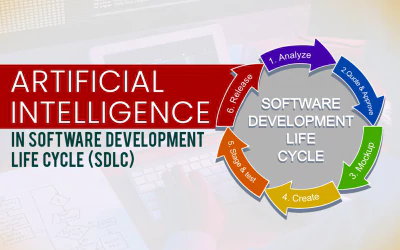Artificial Intelligence (AI) is been the top trend in the technology industry, and there are no chances of it going down. It has positively impacted almost all business industries, particularly the modern ones, including the software industry.
AI plays a pivotal role in the functioning of the software industry by transforming the software development process. Besides, technology helps companies run their business through smart and intelligent software. Similarly, AI enables software developers to build advanced and reliable software programs by using several machine learning models. It also brings speed and precision to the all-inclusive SDLC (Software Development Life Cycle).
Additionally, AI has minimized the need for correcting errors in coding. As a result, developers can save precious time and focus on developing new features. This integration of AI in software development allows developers to produce error-free programs and applications.
How Does Artificial Intelligence (AI) Impacts Software Development?
Software is at the core of all technology-related products and services. The software development cycle consists of phases. These include requirement analysis, coding, designing, testing, and maintenance of the software.
Requirements and design are considered to be the skeleton of the software development life cycle. Designing is a part of the process that converts the requirements into a comprehensive set of specifications that cover all aspects of the system. However, the minimum interaction between development and design teams can cause various issues during the design process. Consequently, these issues may end up in production delays, incomplete designs, change in orders, and rework, etc.
Nevertheless, artificial Intelligence can solve these problems by automating certain processes and techniques.
Benefits of AI in SDLC
Advances in machine learning techniques are known to have accelerated SDLC. Artificial Intelligence-based systems can automate several coding tasks like auto-completing coding segments and locating bugs. Hence, software development companies are using AI to improve the overall software development process including agile test automation.
To understand this better, let’s discuss some interventions facilitated by AI in the software development process. Besides, we’ll also explore how AI results in highly customized products and services for end users.
1. Automated Code Generation
AI has made the process of code generation faster by completing code lines and suggesting snippets of code that can be reused. In the past, code development consumed most of the development process.
However, AI is expected to bring a broader revolution by being able to write code following a text description through programs such as GPT-3.
2. Quick Testing
Product quality in software development can only be gauged by software testing. The AI-powered software testing tools can quickly do so and improve product quality by fixing bugs.
Similarly, AI tools also help programmers predict situations or bugs that may impact the performance of the software. With AI, developers can use certain machine learning algorithms in testing software programs. This way, they need not worry about a bug-embedded executable file.
Moreover, AI tools are also known for regression testing and generating test results without having to perform the test in reality.
3. Improved Software Design
Setting up an appropriate design for each phase of the software development life cycle has never been an error-free task for developers. AI-empowered SDLC tools study the requirements to find inconsistencies and suggest improvements.
Besides, AI is capable to utilize its learnings from past projects to analyze current performance and recommend make recommendations.
4. Speedy Prototyping
AI-based logarithm progressively learns from millions of programs. AI does not only decrease defect but also examine traffic issue to consider further optimization.
Similarly, AI can also modify the development process by predicting probable outcomes.
5. Budget Forecasting
Most software development projects surpass pre-estimated budgets and project deadlines. AI can help project managers make accurate budget estimates. They can take into account several factors like project timeline, scope, and required infrastructure. Besides, AI-based systems ensure data-driven decisions based on past data for user stories and previous projects.
6. Maintenance and Support
The ultimate goal of every business enterprise is to ensure a positive customer experience. AI’s ability to predict failures before they occur is a way to anticipate the dynamics of customers’ demands. This feature facilitates regular updates and supplement functionalities.
Similarly, AI’s predictive maintenance based on predictive analytics cuts the maintenance costs and time to a greater extent. As a result, companies can achieve increased customer loyalty and conversions.
Conclusion
AI has proven to be a game-changer in the software development process. It has significantly impacted the design and creation process in software development. Numerous AI-empowered tools are available for streamlining and automating the software development process.
Moreover, AI has considerably reduced the workload of software developers who have learned to adopt the potential offered by AI. AI-based analytics enables automated decision-making, optimized software development, and regular maintenance. The technology offers benefits like improved features and updates while saving time and money.
In short, AI provides the breeding ground for further innovations in the most efficient way possible.
If you have decided to transform writing to us at your business with AI technology, contact Khired Networks info@khired.com. We are a reliable SaaS company with unmatched expertise to meet your professional requirements. Besides, we ensure that our state-of-the-art services and products will surpass your expectations.

